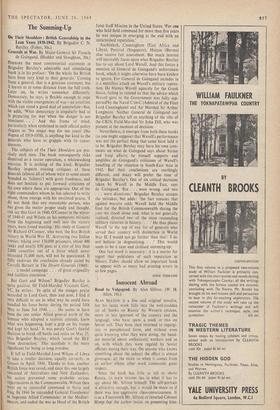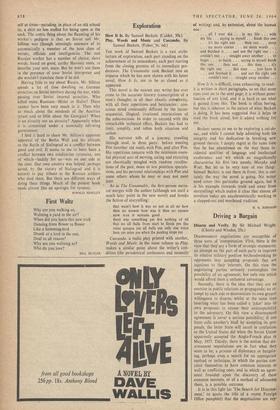Innocent Abroad
Road to Volgograd. By Alan Sillitoe. (W. H. Allen, 18s.)
ALAN SILLITOE is a fine and original novelist, but his latest work falls into the well-trodden rut of 'books on Russia' by Western citizens, more or less ignorant of the country and the language, who' have spent a week or two on Soviet soil. They have then returned to regurgi- tate in paraphrased form, and without even quite knowing what they were doing, the hand- out material about enthusiastic workers and so on, with which they were regaled by Soviet officials during their stay. On anyone who knows something about the subject the effect is almost grotesque, all the more so when it comes from an author whose other work commands great respect.
Since the book has little to tell us about Russia, its main interest lies in what it has to say about Mr. Sillitoe himself. The self-portrait is attractive enough, but it would be more so if there was less aggressive class-consciousness. It is as a Fourteenth Mr. Sillitoe or inverted Colonel Blimp that the author insists on presenting him- self at times—parading, in place of an old school tie, a shirt no less stuffed for being open at the neck. The comic thing about the flaunting of his worker's pedigree is that on Soviet soil Mr. Sillitoe was (though seemingly unaware of it) automatically a member of the boss class of writers, officials and intelligentsia. The real Russian worker has a number of choice, short words, based on good, earthy Slavonic roots, to describe your sort, mate. But he won't use them in the presence of your Soviet interpreter and she wouldn't translate them if he did.
Having little to say about Russia, Mr. Sillitoe spends a lot of time dwelling on German -atrocities on Soviet territory during the war, while passing over Soviet internal atrocities. Who killed -more Russians—Hitler or Stalin? There cannot have been very much in it. Then why so much about the misdeeds of the Austrian tyrant and so little about the Georgian? When is an atrocity not an atrocity? Apparently when it is committed under a nominally left-wing government.
I find it hard to share Mr. Sillitoe's apparent approval of the Berlin Wall and his attitude to the Battle of Stalingrad as a conflict between good and evil. It seems to me to have been a conflict between two totalitarian tyrannies, one of which—luckily for us—was on our side at the time. Our own country was helped, perhaps saved, by the victory of Stalingrad and it is natural to pay tribute to the Russian soldiers who died there. But there are different ways of doing these things. Much of the present book reads almost like an apologia for tyranny.



































 Previous page
Previous page